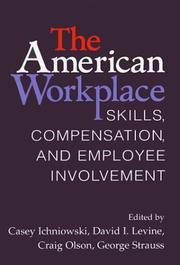| Listing 1 - 4 of 4 |
Sort by
|

ISBN: 1107192323 1282539175 9786612539176 0511718837 0511719280 0511515014 0511718373 0511620020 0511516290 9780511719288 0521650283 9780521650281 9781107192324 9781282539174 6612539178 9780511718830 9780511515019 9780511718373 9780511620027 9780511516290 9780521089975 0521089972 Year: 2000 Publisher: Cambridge, UK New York Cambridge University Press
Abstract | Keywords | Export | Availability | Bookmark
 Loading...
Loading...Choose an application
- Reference Manager
- EndNote
- RefWorks (Direct export to RefWorks)
Many managers are frustrated by a bewildering array of advice about what works in the workplace. This volume contributes to a growing consensus about effective workplace practices. The collection combines detailed studies of single industries (automobile assembly, apparel, and machine tools) with cross-industry studies of financial performance. Compared to most past investigations, the research here has better measures of both workplace practices and organizational performance. The contributors find that systems of innovative human resource management practices can have large effects on business performance. Success does not come from any single innovation, but from a coherent system encompassing pay, training, and employee involvement. Although a majority of contemporary US businesses now have adopted some innovative work practices, only a small percentage of businesses have adopted a coherent new system. A concluding chapter outlines barriers to diffusion and discusses public policies to remove barriers and enhance dissemination of effective management.
Industrial management --- Organizational effectiveness. --- Management --- Creative ability in business --- Business creativity --- Business --- Success in business --- Organization --- Employee participation --- Organizational effectiveness --- E-books --- #SBIB:316.334.2A553 --- #SBIB:316.334.2A555 --- #SBIB:35H303 --- Personeelsbeleid en loonbeleid, functieclassificaties --- Partijen en strategieën in de onderneming: patronaat en werkstructurering, werkoverleg, taakverruiming, humanisering --- Organisatieleer: mensen --- Business, Economy and Management --- Economics

ISBN: 9027217769 9786613327765 1283327767 9027275629 9789027275622 9781556198304 1556198302 1556198302 9789027217769 Year: 1998 Volume: 6 Publisher: Amsterdam Philadelphia J. Benjamins Pub.
Abstract | Keywords | Export | Availability | Bookmark
 Loading...
Loading...Choose an application
- Reference Manager
- EndNote
- RefWorks (Direct export to RefWorks)
While the need to utilise knowledge from social research in processes of development in working life is growing, there is also a growing recognition of the problems posed by this utilisation. As the belief in universal reason and general theory about topics like work organization and leadership has faded, research has to find a place as a local development actor. As such it is part of broad groups of actors, or development coalitions, as they are called in this book. Each coalition acquires unique characteristics and demands unique contributions from participating researchers. At the same time
Research, Industrial --- Technological innovations --- Organizational change --- Recherche industrielle --- Changement organisationnel --- Innovations --- Economic aspects --- Aspect économique --- Organizational change -- Norway. --- Research, Industrial -- Economic aspects -- Norway. --- Technological innovations -- Norway. --- Business & Economics --- Economic History --- Technologische innovatie 60:658.012.1 --- Arbeidsomstandigheden 658.382 --- Regionale economie 332.1 --- Aspect économique --- Change, Organizational --- Organization development --- Organizational development --- Organizational innovation --- Breakthroughs, Technological --- Innovations, Industrial --- Innovations, Technological --- Technical innovations --- Technological breakthroughs --- Technological change --- Contract research --- Industrial research --- Management --- Organization --- Manpower planning --- Creative ability in technology --- Inventions --- Domestication of technology --- Innovation relay centers --- Technology transfer --- Research --- Engineering experiment stations --- #SBIB:316.334.2A520 --- #SBIB:316.334.2A554 --- #SBIB:316.334.2A555 --- Organisatiesociologie: arbeidssituatie en arbeidsomstandigheden: algemeen --- Partijen en strategieën in de onderneming: technologische verandering en zijn effecten op structuur en inhoud van de arbeidsposten --- Partijen en strategieën in de onderneming: patronaat en werkstructurering, werkoverleg, taakverruiming, humanisering

ISBN: 1501728792 9781501728792 0801442893 9780801442896 Year: 2018 Publisher: Ithaca, NY
Abstract | Keywords | Export | Availability | Bookmark
 Loading...
Loading...Choose an application
- Reference Manager
- EndNote
- RefWorks (Direct export to RefWorks)
In 1996, Darius Mehri traveled to Japan to work as a computer simulation engineer within the Toyota production system. Once there, he found a corporate experience far different from what he had expected. Notes from Toyota-land, based on a diary that Mehri kept during his three years at an upper-level Toyota group company, provides a unique insider's perspective on daily work life in Japan and charts his transformation from a wide-eyed engineer eager to be part of the "Japanese Miracle" to a social critic, troubled by Japanese corporate practices.Mehri documents the sophisticated "culture of rules" and organizational structure that combine to create a profound control over workers. The work group is cynically used to encourage employees to work harder and harder, he found, and his other discoveries confirmed his doubts about the working conditions under the Japanese Miracle. For example, he learned that male employees treated their female counterparts as short-term employees, cheap labor, and potential wives. Mehri also describes a surprisingly unhealthy work environment, a high rate of injuries due to inadequate training, fast line speeds, crowded factories, racism, and lack of team support. And in conversations with his colleagues, he uncovered a culture of intimidation, subservience, and vexed relationships with many aspects of their work and surroundings. As both an engaging memoir of cross-cultural misunderstanding and a primer on Japanese business and industrial practices, Notes from Toyota-land will be a revelation to everyone who believes that Japanese business practices are an ideal against which to measure success.
Corporate culture --- Industrial relations --- Work environment --- Automobile industry and trade --- Climate, Workplace --- Environment, Work --- Places of work --- Work places --- Working conditions, Physical --- Working environment --- Workplace --- Workplace climate --- Workplace environment --- Worksite environment --- Environmental engineering --- Industrial engineering --- Automotive industry --- Motor vehicle industry --- Management. --- Mehri, Darius --- Travel --- Toyota Jidōsha Kabushiki Kaisha --- Toyota Motor Corporation --- トヨタ自働車株式会社 --- トヨタ自動車株式会社 --- トヨタ自動車株式會社 --- 豊田自動車株式会社 --- 豐田自動車株式会社 --- Toyota Jidōsha Hanbai Kabushiki Kaisha --- Toyota Jidōsha Kōgyō Kabushiki Kaisha --- #SBIB:316.334.2A551 --- #SBIB:316.334.2A552 --- #SBIB:316.334.2A555 --- Management --- Partijen en strategieën in de onderneming: ondernemingsbeleid en management --- Partijen en strategieën in de onderneming: scientific management, tijds- een bewegingsstudies, beoordelingstechnieken, Taylorisme, kwaliteitsmanagement --- Partijen en strategieën in de onderneming: patronaat en werkstructurering, werkoverleg, taakverruiming, humanisering

ISBN: 1556198310 9027217777 9786612163579 1282163574 9027299404 9789027299406 Year: 1999 Volume: v. 7 Publisher: Amsterdam ; Philadelphia, Penn : John Benjamin,
Abstract | Keywords | Export | Availability | Bookmark
 Loading...
Loading...Choose an application
- Reference Manager
- EndNote
- RefWorks (Direct export to RefWorks)
Work Organization has achieved recent prominence in European policy, as new employment guidelines are embodied in the policies of all European Member States. New forms of Work Organization, properly understood, offer collaborative competitive advantage to European enterprises. This book, based on decades of action research in separate European nations, identifies the research background from which these new insights and policy initiatives have emerged, with continuing lessons to be learned from differences.Work Organization is the missing link which enables innovation and training to pro
Industrial concentration --- Business networks --- Labor supply --- Regional economics --- Concentration industrielle --- Réseaux d'affaires --- Economie régionale --- Case studies --- Cas, Etude de --- Etudes de cas --- Europe --- Economic conditions --- Regional disparities --- Conditions économiques --- Disparités régionales --- Cas, Etude --- Arbeidsorganisatie 331.103 --- Bedrijfsleven 658:338 --- Netwerken 519.876.3 --- #SBIB:316.334.2A520 --- #SBIB:316.334.2A555 --- #SBIB:316.334.2A470 --- Organisatiesociologie: arbeidssituatie en arbeidsomstandigheden: algemeen --- Partijen en strategieën in de onderneming: patronaat en werkstructurering, werkoverleg, taakverruiming, humanisering --- Arbeidssociologie: het sociaal-economisch overheidsbeleid: algemeen --- Business networks -- Europe -- Case studies. --- Europe -- Economic conditions -- 1945- -- Regional disparities -- Case studies. --- Industrial concentration -- Europe -- Case studies. --- Labor supply -- Europe -- Case studies. --- Regional economics -- Case studies. --- Industrial Management --- Management --- Business & Economics --- Réseaux d'affaires --- Economie régionale --- Conditions économiques --- Disparités régionales --- Labor force --- Labor force participation --- Labor pool --- Work force --- Workforce --- Business networking --- Networking, Business --- Networks, Business --- Combinations, Industrial --- Concentration, Industrial --- Economic concentration --- Labor market --- Human capital --- Labor mobility --- Manpower --- Manpower policy --- Social networks --- Industrial clusters --- Strategic alliances (Business) --- Big business --- Duopolies --- Oligopolies --- Trusts, Industrial --- Competition --- Consolidation and merger of corporations --- Industrial organization
| Listing 1 - 4 of 4 |
Sort by
|

 Search
Search Feedback
Feedback About UniCat
About UniCat  Help
Help News
News